Fads
Parisian Tree Climbers
After World War II, some Parisians embraced existentialism. Others took to climbing trees in their underwear.Images and text from Life (July 18, 1949).
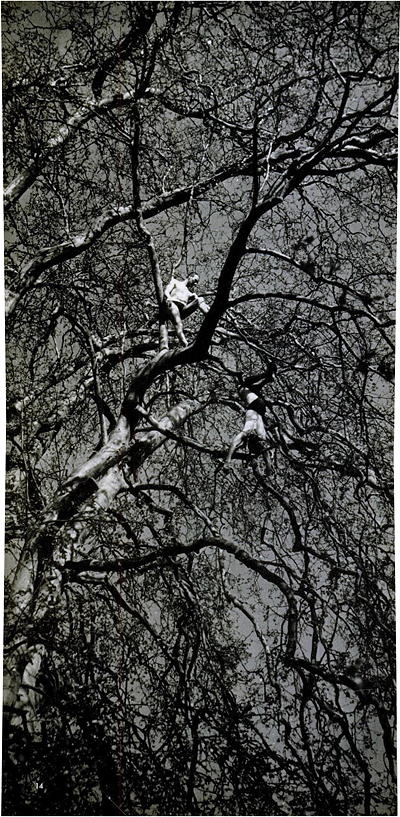
"Treetop acrobatics are privilege of veteran climbers who go as high as 100 feet above ground"

"Prettiest tree climber is 25-year-old Catherine Arley, an actress specializing in comedy roles"
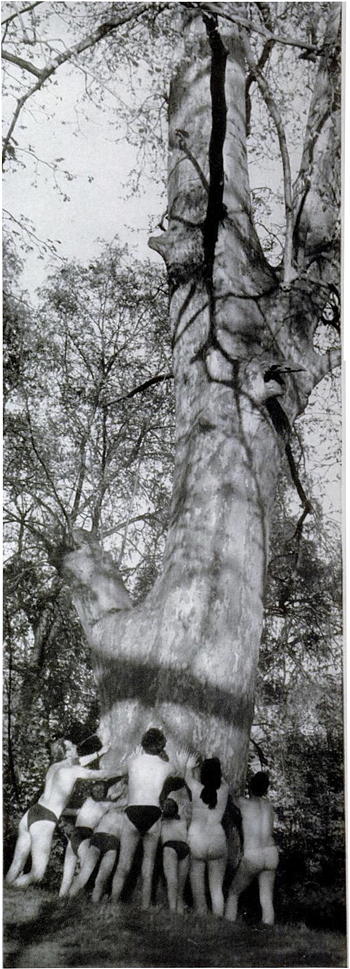
"Preclimb ritual finds scantily-clad members saluting huge plane tree, which Cofounder Jacques Gall recently described as a 'symbol of heaven.'"
Posted By: Alex - Tue Oct 11, 2022 -
Comments (3)
Category: Fads, Nature, 1940s
The Mozambique Dance
The ladies don't come onstage soon enough in the video, but that's my only complaint.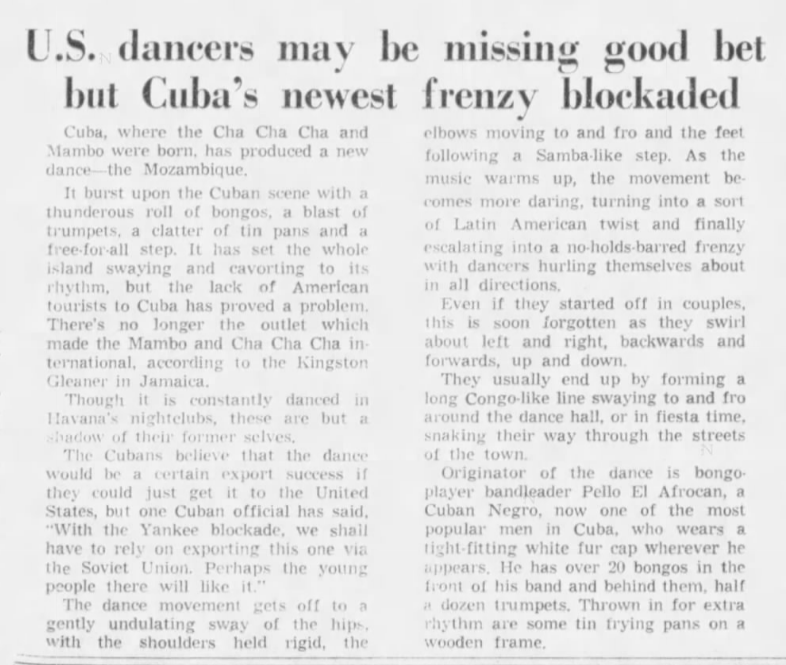
Source: The Province (Vancouver, British Columbia, Canada)18 Feb 1965, Thu Page 29
Posted By: Paul - Tue Jul 19, 2022 -
Comments (0)
Category: Fads, Music, 1960s, Dance, Caribbean
Jazz Poetry
The Wikipedia entry, followed by some examples from the Boston Post, 09 Jan 1921, Sun Page 53.
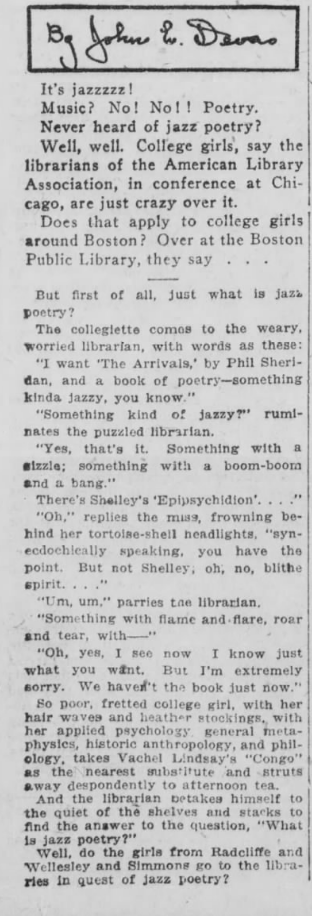


Posted By: Paul - Sat May 28, 2022 -
Comments (1)
Category: Fads, Music, Poetry, Bohemians, Beatniks, Hippies and Slackers, 1920s
Burlap Interior Design
Much as the enthusiastic Mr. Namkin or the dapper corporate icon Mr. Deburco wished it, burlap was not fated to become the next hot interior design fabric. As we all know, burlap was too closely associated with beatniks to be wholly respectable.

Article source: The Record (Hackensack, New Jersey) 01 Oct 1954, Fri Page 24
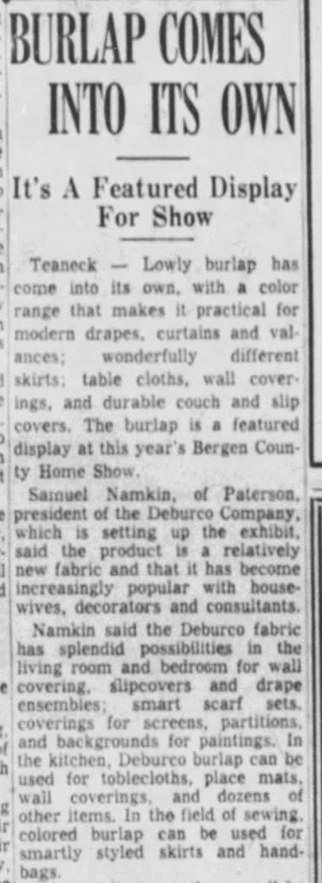
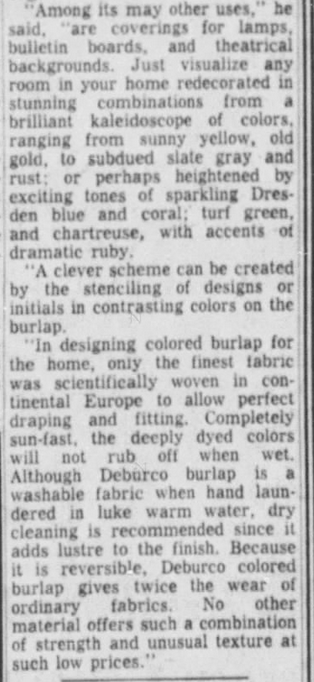
Article source: The Monroe News-Star (Monroe, Louisiana) 06 Mar 1962, Tue Page 12
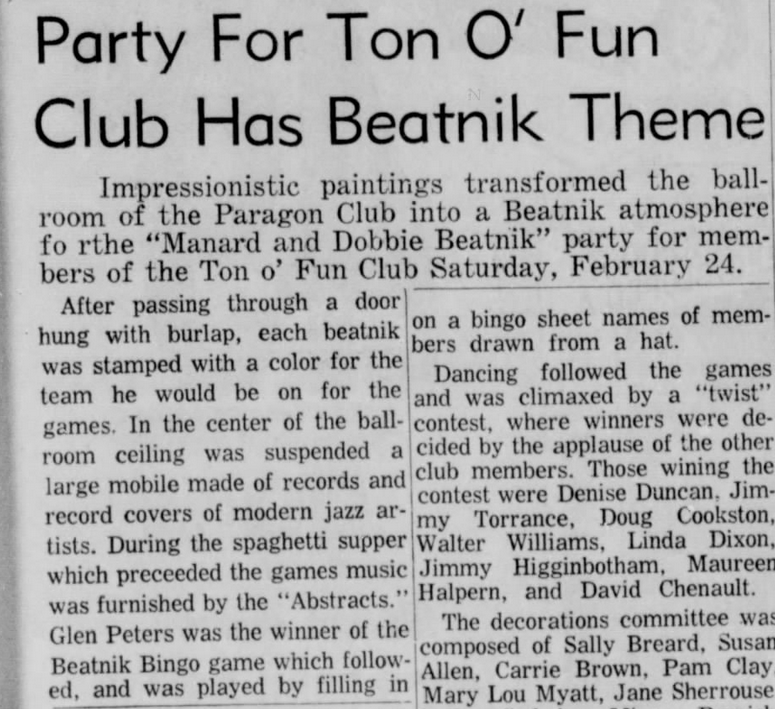
Article source: The Capital Times (Madison, Wisconsin) 30 Jan 1960, Sat Page 6
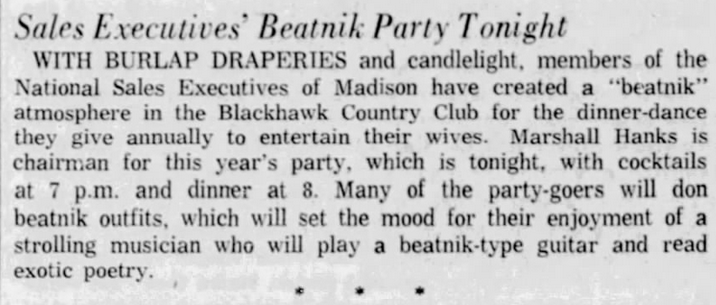
Posted By: Paul - Fri Apr 08, 2022 -
Comments (2)
Category: Fads, Interior Decorating, Bohemians, Beatniks, Hippies and Slackers, 1950s
Spoon bracelet fad alarms cafeterias
Spoon bending, pre-Uri Geller.
Des Moines Register - Oct 15, 1939

Hastings Morning Spotlight - Dec 27, 1938
Posted By: Alex - Sun Mar 20, 2022 -
Comments (2)
Category: Fads, Fashion, 1930s
Hula-Hooping Nuns
I imagine that hula hooping while wearing a habit would add to the challenge.
"Sister Mary Pius gets plenty of encouragement from her sister teachers while giving hula hoop a whirl."

The Daily Oklahoman - Oct 19, 1958
Posted By: Alex - Mon Dec 20, 2021 -
Comments (5)
Category: Fads, Nuns, 1950s
Captain Santa Claus and His Reindeer Space Patrol
Never heard this one till yesterday.The singer's Wikipedia page.
Posted By: Paul - Fri Dec 17, 2021 -
Comments (2)
Category: Animals, Fads, Spaceflight, Astronautics, and Astronomy, Television, 1950s, Christmas
The Piano-Smashing Fad
The fad of piano smashing reportedly began in 1963 at a technical school in Derby, England, but it quickly spread to American campuses via Caltech, where a "Piano Reduction Study Group" was formed.The goal of piano smashing was "to reduce the piano, in the shortest possible time, to such a state that it may be passed through an aperture of 20 cm. in diameter." This was to be done by a maximum of six people using tools no heavier than 15.4 pounds each.
A record-setting time was achieved by students at Wayne State University who smashed a piano and passed it through a hole in 4 min 51 sec.
I wonder if this college fad was the inspiration for the Destructivist Art Movement, which emerged three years later, and also involved smashing pianos.



Source of images: Life - Mar 8, 1963
Posted By: Alex - Wed Sep 29, 2021 -
Comments (4)
Category: Fads, 1960s, Universities, Colleges, Private Schools and Academia
Bailey’s Comets
The Wikipedia page.
According to Mark Arnold's book, Think Pink! The Story of DePatie-Freling Productions, producing the show was a nightmare, due to the massive amount of characters. Not only did the series do extremely poorly in the ratings, it got so costly to produce it nearly broke the studio, curtailing production for that year.
Posted By: Paul - Sun Aug 08, 2021 -
Comments (2)
Category: Contests, Races and Other Competitions, Fads, Ineptness, Crudity, Talentlessness, Kitsch, and Bad Art, Sports, Cartoons, 1970s
The Highest Streakers

I can find absolutely no supporting documentation of this event, but the photo comes from the Library of Congress, so it must be true!
Posted By: Paul - Sat Jul 24, 2021 -
Comments (1)
Category: Architecture, Fads, Public Indecency, 1970s

| Who We Are |
|---|
| Alex Boese Alex is the creator and curator of the Museum of Hoaxes. He's also the author of various weird, non-fiction, science-themed books such as Elephants on Acid and Psychedelic Apes. Paul Di Filippo Paul has been paid to put weird ideas into fictional form for over thirty years, in his career as a noted science fiction writer. He has recently begun blogging on many curious topics with three fellow writers at The Inferior 4+1. Contact Us |




